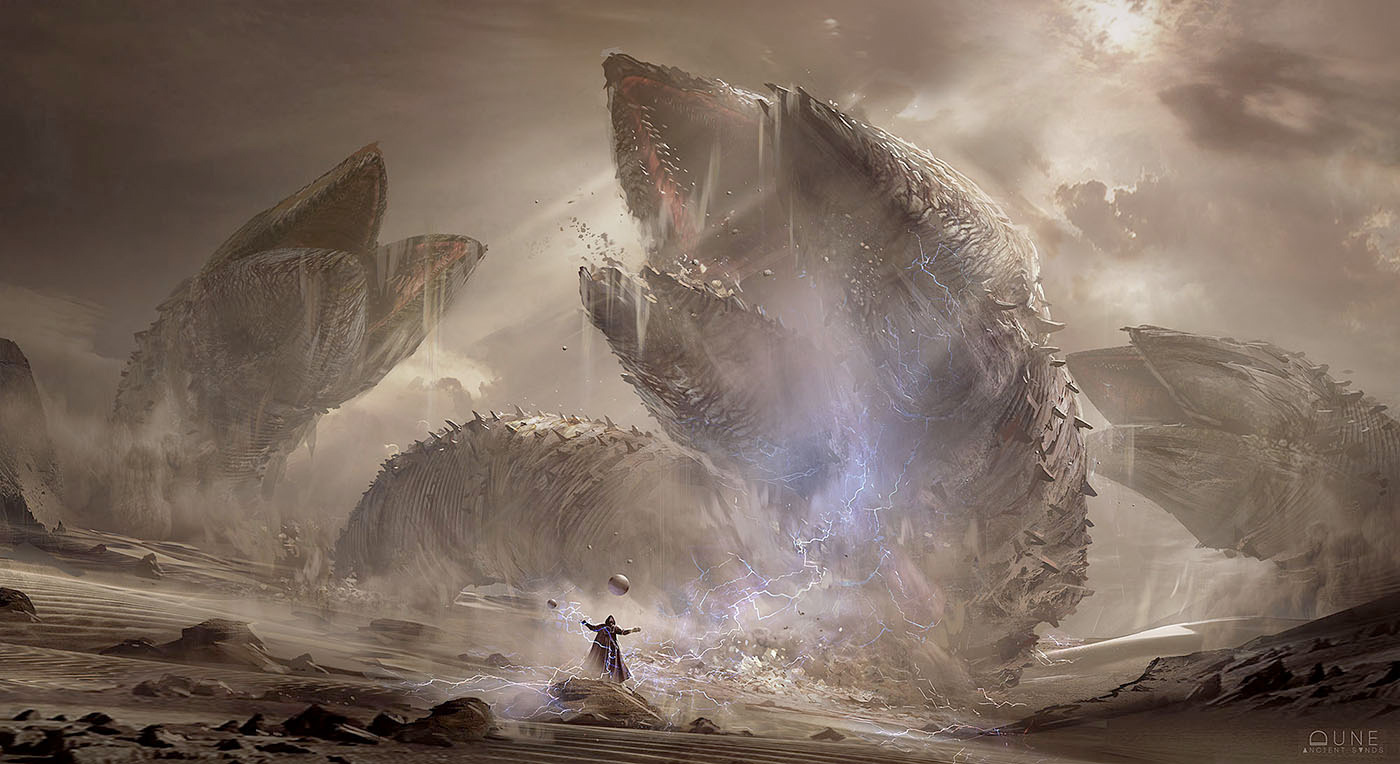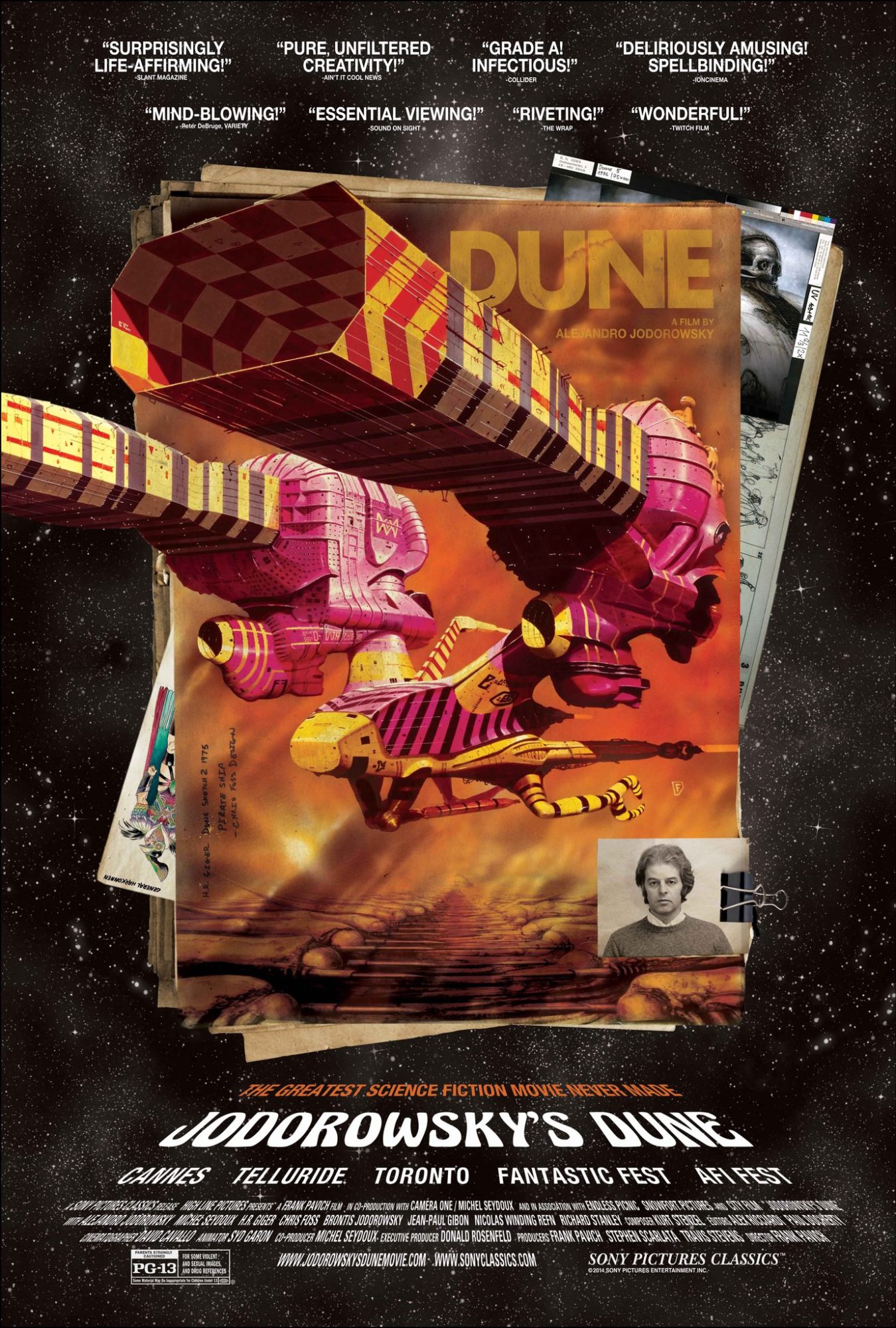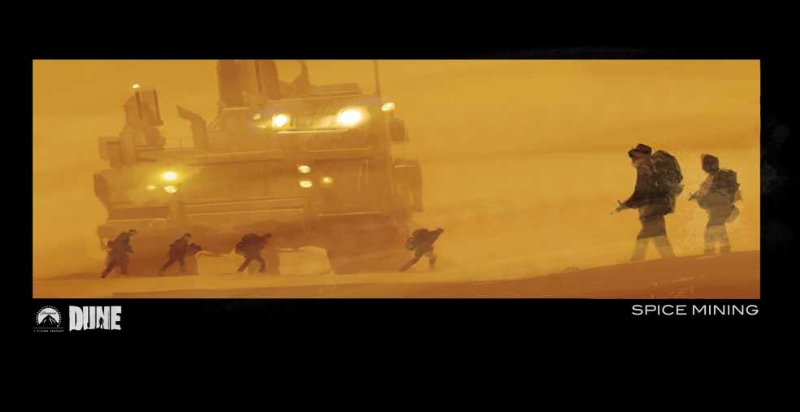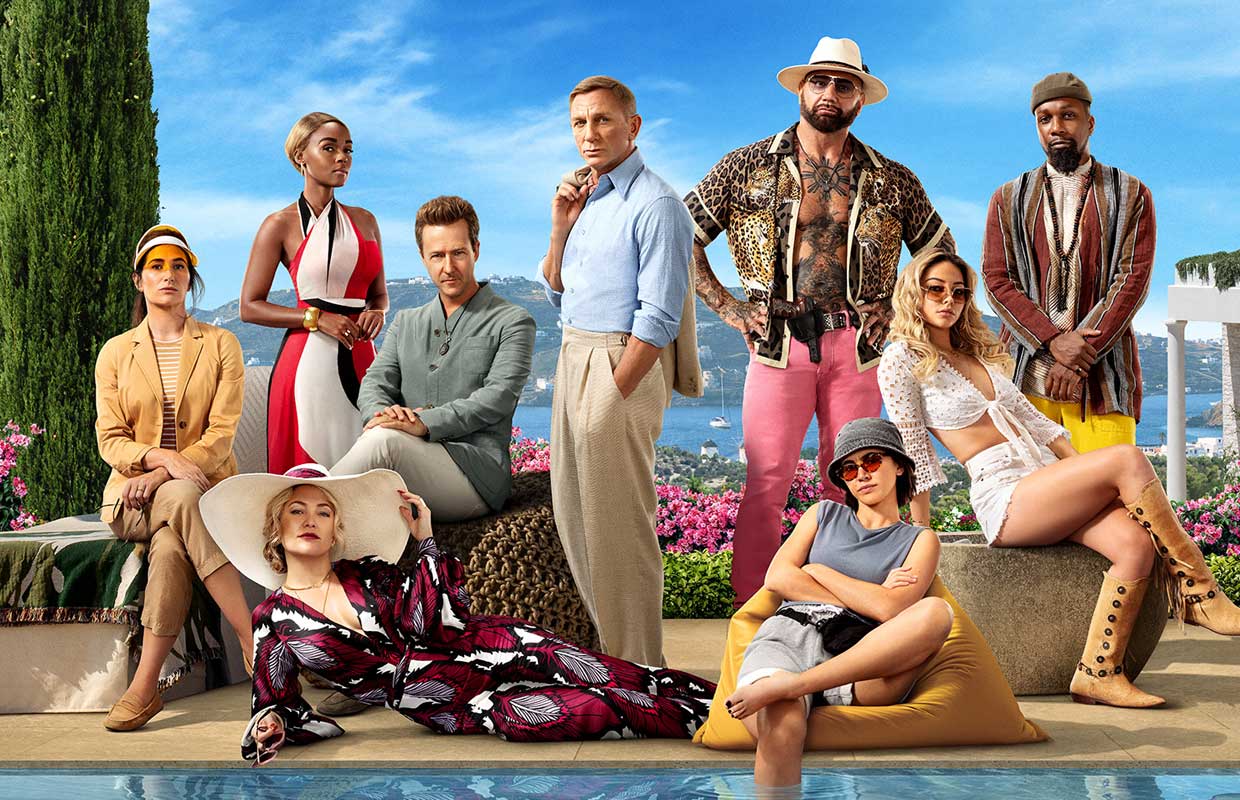
“To attempt an understanding of Muad’Dib without understanding his mortal enemies, the Harkonnens, is to attempt seeing Truth without knowing Falsehood. It is the attempt to see the Light without knowing Darkness. It cannot be.”
– from “Manual of Muad’Dib” by the Princess Irulan
Frank Herbert’s Dune novel has seen several screen adaptations. A Dune film adaptation was proposed almost as soon as the novel was released in 1965. Below is a summary of the major events in the development of Dune film & series adaptations.
Jodorowsky’s Dune
The first serious attempt at a Dune film was made by Chilean French filmmaker Alejandro Jodorowsky starting in 1974. Despite the fact that pre-production was in an advanced state with 2 million dollars already spent out of a proposed budget of 9 million the project fell through. Jodorowsky took a considerable amount of license with the source material. His vision was a 10 hour feature film. The artwork was made by Moebius (Jean Giraud) and has survived to this day.

Jodorowsky’s Dune has often been called the greatest movie that was never made. It is beyond a doubt it influenced a great many movies from Star Wars to Alien and even The Fifth Element. Yet, I am glad it was never made. This adaptation was by the director’s own account not faithful to the source material. The 2013 documentary on the troubled production has an interview in which the director refers in a controversial way to the project. He admits his intention was to ‘rape’ the source material. For an overview of the Jodorowsky’s Dune check out the video below created by Quinn.
David Lynch’s Dune
In 1976 Dino De Laurentiis acquired the rights. The first director to make an attempt was none other than Ridley Scott. Together with Rudy Wurlitzer he wrote a screenplay based on a script written by Frank Herbert himself. Scott envisioned that the movie would be split into two parts before passing on the project to direct Alien and then Blade Runner.
It was director David Lynch who would first succeed in completing a Dune film. Sadly, of the current two adaptations finished it is the weakest. The nominal running time at 136 minutes poorly distils the original novel. Few of the deeper themes remain and where the director made an attempt to do so he resorts to mysticism bordering on magic. This adaptation was meant as the first in a series of movies in order to capitalize on the recent success of the Star Wars Trilogy. But the poor mixture of making the movie more action-packed and reducing its themes left viewers aghast. That together with the poor special effects even for the early 80s makes this Dune adaption one to forget.
David Lynch disowns Dune
Dune 1984 has created a considerable amount of lore. As David Lynch was denied final cut privilege he disowned the film. It is a dubious claim at best. The original theatrical release was heavily cut, from three hours down to just two, but David Lynch was involved. However, Lynch disapproved of the 1988 television version running at three hours even if it comes closest to his original vision. Instead, this version has instead Lynch’s name removed and replaced with the generic Alan Smithee. This version with some alterations has been released as the Extended Edition on DVD. Lynch’s dislike for his own movie has continued and he officially declined an invitation to do a director’s cut. Recently, he even declined to watch the new Dune adaptation by director Denis Villeneuve.
Ultimately the root causes for the failure of this adaptation are not hard to guess. David Lynch was the wrong director. He had not read Dune before he wrote the first screenplay and appears to have missed key themes. Dino De Laurentiis’s involvement is almost comical. His desire to create the next Star Wars out of Frank Herbert’s novel is borderline bizarre. Lynch failed to stand up to Dino De Laurentiis and neither seemed to have contemplated the idea dividing the movie into two. The 1984 Dune is not without a positive legacy however. The soundtrack by Toto and Brian Eno is among my favorite. The rights to the movie also spawned the board game and the Westwood video game series.
Frank Herbert’s Dune
Frank Herbert’s Dune full article
The next successful adaption was done by director John Harrison in what became known as Frank Herbert’s Dune. This version is generally considered to be both faithful and successful. It put what was then known as the Sci Fi Channel on the map. Moreover, the main themes from novel remain and the characters are generally authentically portrayed. Some fans have criticized the casting of Alec Newman as Paul Atreides, for instance. Yet, the more mature look works for me. I do have a gripe with some of the other acting – notably P.H. Moriarty who at time brings his dialogue in way that approaches camp. As principal photography was done in Prague in the Czech Republic there is an abundance of European actors.
Some scenes were added to ensure a better flow of the story. Mostly this expanded the role of Princess Irulan (played by Julie Cox) with the intention of giving the viewer better insight into the motives of House Corrino. This readjustment also ensured more use of certain sets, such as those depicting Kaitain and Giede Prime. However, the poor wardrobe and limited budget has meant even this series is not the grand adaptation fans have long waited for. By today’s standard the series looks dated, and the peculiar choice of hats is considered by many fans as off-putting.
Children of Dune miniseries from 2003
After the success of the miniseries Frank Herbert’s Dune director John Harrison next adapted the two sequel novels: Dune Messiah and Children of Dune. Where possible, the cast and format remained the same. Yet, the increase in budget was reflected in better visuals.
As with the 2000 miniseries these are faithful adaptations of Dune Messiah and Children of Dune. The former can be a confusing book to read and understand, but for somebody who is a novice to the novels will find this miniseries a great help. In Children of Dune Paul is actively undermining his own legacy. He does not want to the father figure of humanity. The thousands of years of solitude that will require subjecting humanity to an enforced period of tranquility repulses him. His enemies: the Tleilaxu, Bene Gesserit and Spacing Build sense this weakness and actively plot against Paul. In the sequel Children of Dune it is Paul’s twins who take on the mantle. His son Leto II in particular is up to the challenge of guiding humanity down its Golden Path – something the enemies of the Atreides actively try to prevent.
Cast changes
Children of Dune retains cast members such as Alec Newman, Julie Cox, Barbora Kodetova and Ian McNiece. There were two notable recasts: Steven Berkoff as Stilgar and Alice Krige as Lady Jessica. Likewise, the series is more famous as the first mainstream success for James McAvoy. Sadly not everybody managed to capitalize on the success of the series. Julie Cox and Jessica Brooks notably did not.
Sadly Children of Dune of was never followed up with another sequel. The next book in the series would have been God Emperor which besides the original is my favorite. As it is set several thousand years after the events of Paul’s life there would have been no need to retain the original cast. Except for James McAvoy as the tyrant Leto II. In the novel God Emperor of Dune some characters bare a striking resemblance to characters from Dune. It would have been great for some of the cast to return in cameo appearances to lend a form of eerie continuity. Alas an adaptation of God Emperor of Dune is elusive.

More failed attempts at a Dune film
As soon as the miniseries was completed news came that Paramount Pictures was interested in another film adaption. Of course the recent success of The Lord of the Rings, shot back-to-back as a trilogy no doubt added to the idea it was possible to film Dune. Peter Berg was the first director to attached before he passed in favor of Pierre Morel. Fans for years speculated who might play what role and how the novel should be adapted, sadly to no avail. However, by 2011 all attempts were stopped.
Denis Villeneuve Dune film
In late 2016 Legendary Entertainment negotiated successfully for the rights to the Dune franchise. Denis Villeneuve was quickly rumored to direct, not least because he was working on a sequel to Blade Runner as well as his public comments that showed interest. Now the 2020 Dune movie is set for release on December 18th. It will adapt half of the novel with the other half is slated for a later date. This is not without risk. Dune is a difficult novel to understand. The movie set for release in 2020 will probably have a running time of 3 hours. Not to mention, with Blade Runner 2049 this caused a large drop in potential movie goers when a similar running time was announced. I hope Denis Villeneuve learns from the mistake of Blade Runner 2049 – it was at times far too indulgent.
So that is it for my overview of Dune film and series adaptations. These are just the highlights, there have been more aborted attempts. Yet, I decided to stick to those that at least made to preproduction.


